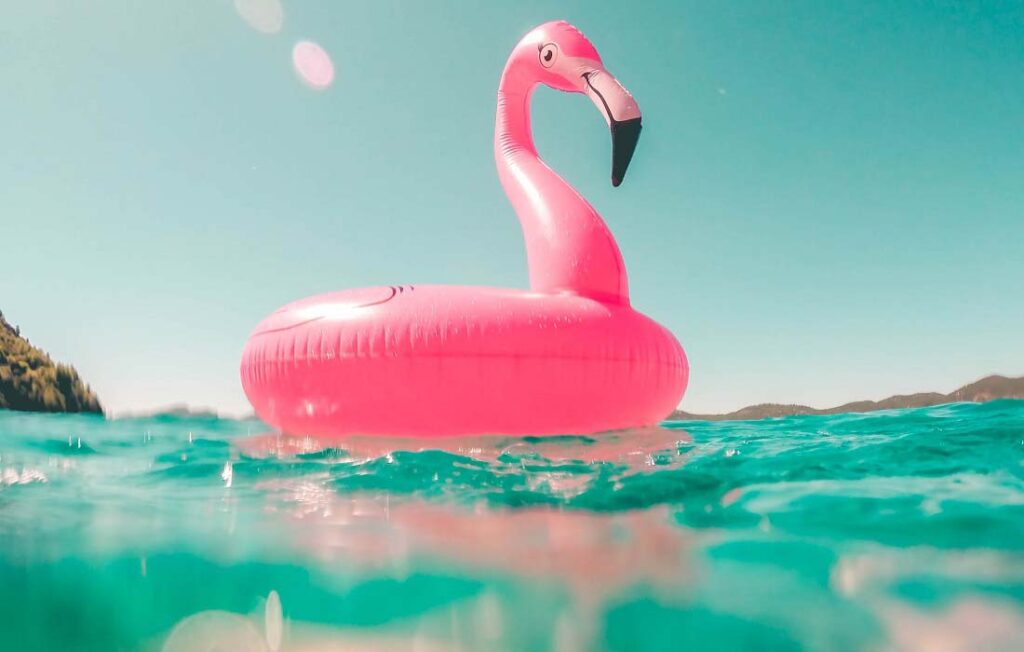It’s hard to top a relaxing summer day at the beach or lake. Unfortunately, these warmer months also bring toxins and a surplus of damaging nutrients to waterways. Heat waves and droughts are also known to bring pollutants into our water supply. So, what can be done about it? In this article, we’re discussing a variety of ways you can beat the heat while helping to keep our waters clean.
Use Reef-Safe Products
Many chemicals found in cosmetics and sunscreens can harm the health of coral reefs and marine life. For example, oxybenzone is a chemical found in thousands of products (particularly sunscreens) that damages marine and freshwater ecosystems. In oceans, it contributes to a phenomenon called coral bleaching. When oxybenzone is introduced to corals, they become stressed and expel the algae that live in their tissues. Because these corals rely on algae to maintain their health, this loss causes the corals to turn white, or “bleach.” Although corals can survive bleaching, they become incredibly fragile and susceptible to death. Without precious corals, these marine ecosystems deteriorate and further damage the plant and wildlife populations that rely on them.
Fortunately, reducing water pollution helps protect aquatic life. Choosing reef-safe sunscreens can help prevent harmful chemicals like oxybenzone from damaging susceptible ecosystems. Next time you plan on spending a day at the lake or beach, be sure to check if your products are safe for the environment and wildlife you may be encountering.
Avoid Nutrient-Loading Soils
Fertilizers and organic waste contain naturally occurring nutrients such as nitrogen and phosphorus. Although these nutrients help promote crop growth, they can ultimately damage our waterways. Fertilizer runoff or septic overflows carry these nutrients in concentrated amounts to water channels. As nitrogen and phosphorus accumulate in lakes or oceans, harmful algae such as cyanobacteria begin to feed on these nutrients.
When temperatures rise, these species multiply and grow out of control, producing harmful algal blooms (HABs) in our lakes and oceans that turn the water a green or red color. This process is known as eutrophication. (You may have heard this more casually referred to as “red tide.”) It is also known to cause ocean acidification, which slows fish and shellfish growth. HABs deplete the water of oxygen, consequently killing its aquatic life. Some species of algae, including cyanobacteria, also produce toxins that can harm humans.
Unfortunately, HABs are becoming more common due to climate change. Luckily, there are simple steps you can take at home to help prevent the growth of these toxic species. For starters, limit your use of fertilizer. When you absolutely must use fertilizer, make sure to stay within the recommended amount to prevent nutrient loading the soil (which leads to nutrient runoff). Second, pick up your pet’s waste and dispose of it properly. (You can create or purchase your own pet waste composter!) When animal waste reaches local waterways, it carries with it the very nutrients that promote HABs. By properly discarding your pet’s waste, you can help ensure that our waters stay clean this summer.
Conserve Water and Practice Fire Safety
The warmer months bring an end to the rainy season, introducing dryer weather that is much more conducive to enjoying the outdoors. However, an end to the rain also means an increase in the risk and intensity of droughts. As a result, stream and river flows slow or become stagnant, and pollutants begin to build up in our waterways. This buildup can accelerate the process of eutrophication, threatening not only aquatic life but rendering our groundwater unsafe for consumption.
Further, dry, windy weather increases the risk of wildfires, which carry ash, charcoal, and other toxic pollutants into our waterways. An overabundance of these in water is harmful to oxygen levels. Once more, our access to clean water becomes hindered.
By conserving water, you can help ensure there’s more clean water to go around—even in times of drought. As a result, you’ll also be preventing nutrient-loaded water runoff and pollution from entering our streams, rivers, lakes, and oceans. Consider limiting your shower time and turning off the tap while you brush your teeth. You may also choose to sweep your driveway and sidewalk rather than using the hose.
Practice fire safety by checking weather conditions before using fireworks, and completely put out campfires before you leave your campsite. Not only will these practices keep you safe, they will also help prevent toxins and debris from accidentally entering our water supply.
Whether you’re splashing around the lake or surfing the ocean waves, make sure you help prevent water pollution this summer by following these simple steps. Share your newfound knowledge with friends and family so they can join in! Together, we can make a positive difference for our water, oceans, and our planet.




